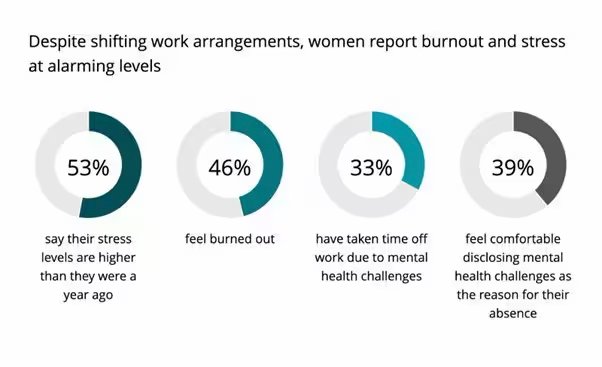Mental health has become one of the defining issues of modern professional life. Long hours, tight deadlines, and constant digital connectivity have blurred the lines between work and personal life. For women in the workforce, these pressures are amplified by additional social, cultural, and structural challenges. Research from the World Health Organization (WHO) shows that women are disproportionately affected by mental health disorders, with 1 in 5 women experiencing a mental health condition compared to 1 in 8 men.
Understanding the specific struggles faced by professional women is critical, not only for their personal well-being but also for building healthier, more sustainable workplaces and societies.
Why Mental Health Matters for Professional Women
Mental health is closely tied to productivity, job satisfaction, and overall quality of life. For professional women, poor mental health often stems from a combination of professional stressors and gender based pressures.
A 2024 Ipsos report on global mental health revealed that 62% of people worldwide feel stressed to a degree that affects daily life, with women reporting higher stress levels than men. This is especially true in industries dominated by long work hours and high emotional labor, such as healthcare, education, and corporate leadership.
Key Challenges Facing Professional Women
The Double Burden of Work and Home: Many women face the “second shift,” working long hours in professional roles and then shouldering the majority of caregiving and household responsibilities at home. This dual burden often leads to chronic stress and exhaustion.
Workplace Inequality: Despite progress, professional women still face pay gaps, slower promotions, and underrepresentation in leadership roles. These inequalities can create frustration, lower self-esteem, and a constant sense of having to “prove oneself” more than male counterparts.

Harassment and Gender Bias: Workplace harassment and subtle gender bias significantly affect mental well-being. Women who experience harassment are more likely to suffer from depression, anxiety, and post-traumatic stress disorder. Even microaggressions, when repeated, take a heavy psychological toll.
Unrealistic Expectations: Societal pressures to “have it all” a successful career, family, and perfect personal life create unrealistic standards that many women feel they cannot meet. This gap between expectation and reality fuels stress and low self-worth.
Lack of Support Systems: Limited access to workplace childcare, flexible policies, and mentorship programs often leaves professional women isolated. Without strong support networks, managing work-life balance becomes even more challenging.
The Statistics: A Gendered Burden
Although exact numbers vary across regions, global and national statistics highlight the disproportionate impact of mental health issues on professional women.
According to WHO data, women are twice as likely as men to be diagnosed with anxiety disorders. Young Professionals Over 26% of women aged 16–24 report experiencing a mental health problem within a given week.
The Global Burden of Disease Study (1990–2019), for every 1 man, 10 women in Pakistan are affected by mental disorders. Depressive disorders were the most common, contributing nearly 3.9% of women’s disability adjusted life years (DALYs) compared to 2.3% for men. These statistics show that while men certainly experience mental health challenges, professional women carry a heavier burden due to intersecting social and workplace factors.
The Role of Social and Cultural Pressures
In many societies, women’s professional identities are shaped not just by their jobs but also by cultural expectations. For example, in South Asia, women working outside the home may face criticism or pressure to “balance” careers with traditional family roles. These cultural factors magnify stress and leave professional women feeling torn between competing identities.
Building Healthier Futures for Professional Women
Improving mental health outcomes for professional women requires a multi-level approach, involving workplaces, policymakers, communities, and individuals themselves.
Workplace Interventions: Flexible policies like remote work, flexible hours, and parental leave policies reduce stress for working mothers. On-site or virtual counseling can normalize mental health support. Strong anti- harassment policies and gender sensitivity training build safer, more inclusive workplaces.
National Level Policies: Governments should prioritize mental health in national health plans, ensuring affordable and accessible care. Enforcing equal pay, workplace safety, and anti-discrimination laws directly reduces stressors for women in the workforce.
Building Strong Social Networks: Professional women benefit from mentorship, peer support groups, and women’s associations. These networks create a sense of belonging and reduce isolation.
Reducing Stigma: Perhaps the most important solution is reducing stigma. When professional women feel empowered to seek therapy or counseling without judgment, the path to recovery becomes easier. Workplace and media campaigns can help normalize conversations around mental health.
Building Strong Social Networks: Professional women benefit from mentorship, peer support groups, and women’s associations. These networks create a sense of belonging and reduce isolation.
Personal Self Care Practices: While systemic changes are vital, personal strategies also play a role. Self-care practices such as regular exercise, mindfulness, journaling, and prioritizing sleep can strengthen resilience against daily stressors.
Customized Employee Assistance Programmes (EAPs)
Organisations expand their generic EAP offerings (e.g., counselling, therapy referrals) to include modules and support specifically for women — covering reproductive health, maternity and postpartum support, menstrual health, career progression challenges, domestic balance, and dealing with harassment or gender-based stressors.
Role Models & Culture Change
Leadership (especially women leaders) is engaged as champions to speak about mental health, normalizing help-seeking.
Looking Ahead
The mental health of professional women is not just a women’s issue; it is a societal and economic priority. When women thrive mentally and emotionally, their productivity, creativity, and leadership potential increase, benefiting workplaces and communities alike.
The statistics are clear: women are disproportionately affected by anxiety, depression, and workplace burnout. But solutions exist. By building supportive environments at work, enforcing fair policies, and encouraging women to seek help, societies can bridge the gender gap in mental health.
Mental health is not a luxury; it is a necessity for every professional woman striving to succeed in a demanding world.






